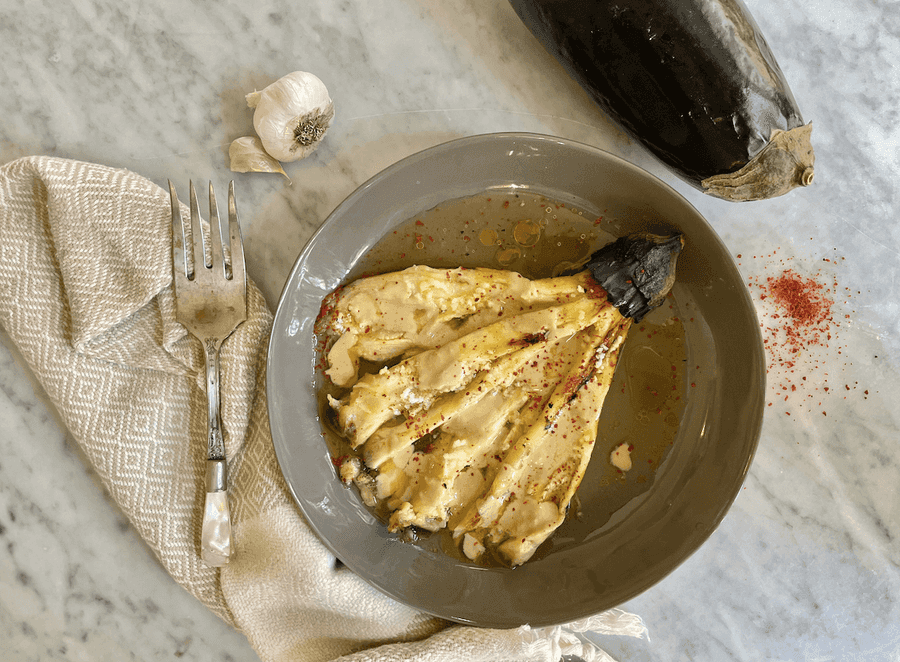Eggplant for Neuroprotection and “The Legend”
by Amylee Amos PhD, RDN, IFMCPRecipes
Ustura (‘The Legend’ in Arabic) is a staple dish on the coast of Syria, Lebanon, and Turkey. This eggplant based dish is lesser known than its spin off dish, Baba Ghanoosh, and is a common appetizer throughout the Middle East. It is normally served with other meze or small appetizers such as hummus and muhammara, and it is often paired with Arak- an anise flavored Syria spirit.
Eggplant is a very popular vegetable in the Middle East. It is grown year round because the different varieties of eggplant are rotated throughout the seasons. In Syria, it is prepared in countless ways: stuffed, stewed, baked, grilled, and even pickled! Besides the rich flavor and versatility of the vegetable, the importance of eggplant comes from the nutritional value that it provides.
Eggplant has gotten a bad wrap in the United States because it falls into the family of nightshade vegetables. The nightshade vegetables which include eggplant, potatoes, tomatoes, and peppers, contain a compound called solanine, that has been blamed for the pain and swelling associated with arthritis. The thing is, the research does not support these claims. However, it is true that some people report food sensitivities to one or several nightshades, just like individuals have sensitivities to other foods. In these individuals, nightshades should be avoided. But for the majority of people who do not have a sensitivity, the nightshade vegetables have wonderful health properties and the support for including them in the diet comes from centuries of use in the diets of ancient cultures. They are also a key feature in the best studied diet for healthspan and longevity- the mediterranean diet. Unless you have a specific sensitivity to nightshades, this family of vegetables can be a nutrient dense addition to the diet. Specifically, eggplant is rich in fiber and contains magnesium, potassium, and calcium among other micronutrients (1). Eggplant contains an array of phytonutrients such as anthocyanins, including one called nasunin, which has been shown to be a potent free radical scavenger, meaning that it aids in the reduction of oxidative damage (2). Additionally, the anthocyanins and other flavonoids found in eggplant protect vulnerable brain cells and enhance the function of existing neuronal structures, promoting cognitive function (3).
Start adding eggplant into your meal routine. You will increase and/or diversify your intake of important micronutrients, and you will be boosting your intake of phytonutrients known to be neuroprotective. Try out this decadent eggplant dish and you’ll soon see why it’s known as ‘the Legend’!
Ingredients:
- 1 large eggplant
- 2 lemons, juiced
- 3 medium cloves garlic, minced
- 1½ tablespoons extra virgin olive oil
- 3 tablespoons tahini
- Salt to taste
- Aleppo pepper for garnish (optional)
Directions:
- Grill the eggplant on the stove top (or grill), rotating the eggplant every 10-12 minutes to cook all sides. The eggplant skin should become charred and the inner eggplant very soft.
- Allow the eggplant to cool, then remove the skin, while keeping the stem intact. The skin should peel off easily.
- Holding the eggplant from the stem, slice it into vertical pieces while keeping it connected by the stem.
- Spread the eggplant out on a large plate.
- Whisk together the garlic, olive oil, lemon juice, and salt. Pour over the eggplant evenly.
- Drizzle the tahini over the eggplant.
- Serve immediately.
References:
- Basic report: 11210, Eggplant, cooked, boiled, drained, without salt. (2016, May). Retrieved from https://ndb.nal.usda.gov/ndb/foods/show/2963?
- Noda, Y., Kneyuki, T., Igarashi, K., Mori, A., & Packer, L. (2000, August). Antioxidant activity of nasunin, an anthocyanin in eggplant peels. Toxicology. 7;148(2-3):119-23.
- Spencer, J. (2010). The impact of fruit flavonoids on memory and cognition. Bristish Journal of Nutrition, 104: 40-47.
- Jorge, P. A., Neyra, L. C., Osaki, R. M., de Almeida, E., & Bragagnolo, N. (2008, February). Effect of eggplant on plasma lipid levels, lipidic peroxidation and reversion of endothelial dysfunction in experimental hypercholesterolemia [Abstract]. Archive of Arquivos Brasileiros de Cardiologia. 70(2):87-91.
- Stommel, J. R. & Whitaker, B. D. (2003, September). Phenolic acid content and composition of eggplant fruit in a germplasm core subset [Abstract]. Journal of the American Society for Horticultural Science 128(5), 704-710.